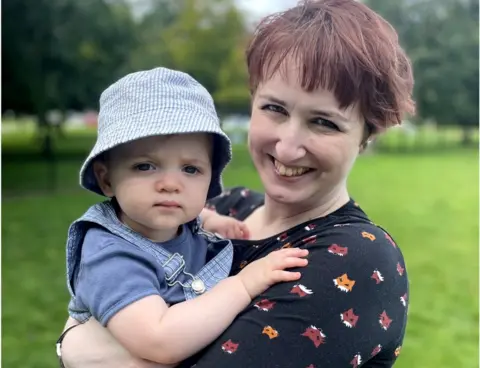Seven-fold increase in adult ADHD prescriptions over 10 years
 Mary Carrera
Mary CarreraThe number of adults receiving an NHS prescription for ADHD has increased seven-fold over the last 10 years, BBC Scotland has learned.
The condition, which affects people's behaviour, has been traditionally associated with children.
But new figures obtained from Public Health Scotland show that now almost as many adults are being treated for ADHD.
And they show a notable rise in the number of adult prescriptions since the Covid pandemic.
It has led to a call for increased resources for services supporting people with the condition.
The symptoms of attention deficit hyperactivity disorder (ADHD) can include a difficulty concentrating and focusing, hyperactivity and impulsiveness.
When hyperactivity or impulsiveness is not present, the condition is called attention deficit disorder (ADD).
Medication in the form of tablets taken orally combined with therapy are considered the best way to deal with the condition, according to the NHS.
Stimulants such as methylphenidate are the most commonly used medication for ADHD. Methylphenidate is known by a number of brand names, including Ritalin, Daytrana and Quillivant.
'It all made sense'
Mary Carrera is one of more than 12,000 adults in Scotland taking medication for the condition, after being diagnosed in 2021.
She spotted the symptoms in herself while researching the topic as part of her job as a digital content designer for NHS 24.
"I was like, that's me on the screen, all those symptoms," the 37-year-old said.
"I'm forgetful, I can't concentrate, I learned the phrase executive dysfunction [which can affect ability to plan, organise and prioritise tasks] and suddenly like it all made sense."

Ms Carrera said she struggled to do household tasks, would put off doing things and was not good at time management.
"I was constantly being called stupid, lazy, careless all that stuff. It was absolutely devastating, but when I saw the list of symptoms I realised that was it."
She could not begin her medication when she was diagnosed because she was pregnant but now she is taking it and said it has made a "massive" difference to her life.
"It's become easier for me to to regulate what I pay attention to, I feel a lot less tired, I guess my brain isn't struggling as much and I feel like I can finish a thought, it's a lot more orderly," she said.
Cognitive behavioural therapist Geraldine Mynors, who runs an ADHD parent support group in Glasgow, said that medication was "not a magic bullet" and cautioned against taking short cuts for an ADHD diagnosis.
Speaking to the BBC's Good Morning Scotland programme, she said: "It's a spectrum condition, we all have little traits of this - but [for] somebody with true ADHD, it will be causing really significant difficulties in all the different areas of their life.
"It is incredibly important that people get a proper assessment, not just a quick quiz on the internet.
"You need a proper multi-disciplinary team assessment and to have your whole mental health history looked at, to look for other things that might be causing these same symptoms. Trauma for example can look like ADHD in some cases because it can make people look jumpy and scattered."
How many adults in Scotland are on medication for ADHD?
Data obtained from Public Health Scotland under freedom of information laws show that almost 26,000 NHS patients were prescribed ADHD drugs in 2022/23.
Of them, almost half (12,182) were adults.
The number of adult prescriptions has risen steadily since 2013/14 when there were 1,603, but it has doubled since 2019/20 when 5,920 were recorded.
There has also been an increase in the number of children and young people aged 19 and under receiving medication for the condition.
In 2012/13, a total of 6,172 of those patients had a prescription for ADHD. That number stood at 13,722 in 2022/23.
Dr Pavan Srireddy, a consultant psychiatrist and policy lead at the Royal College of Psychiatrists in Scotland, said the figures were "extremely worrying".
"But not because of a concern that it has become trendy," he said.
"It is not possible for an existing service to have an increase in referrals of over 500% for a condition and still be able to provide a safe and effective service without an increase in resources."
Why the increase?
Dr Srireddy said that an increased awareness of adult ADHD among health professionals and the wider public was almost certainly the cause of its increasing prevalence.
"Awareness of ADHD in children has been longstanding but awareness of this in adults has only really increased in the past 10-15 years," he said.
"The reasons for this marked increase after the pandemic appear to be complex and there is no single definitive reason that might explain this."
 Ashley Hope
Ashley HopeAshley Hope, a co-founder of ADHD support group Dopamine Dolls, said that the lockdowns and working from home had a huge impact on ADHD symptoms and may help explain the rise.
"Structures and routines helped a lot of us manage our symptoms," she said.
"Some other members have also noted maternity leave, long periods of unemployment and retirement as times when their ADHD symptoms have become more apparent too."
It was a lack of other NHS support that led Ms Hope and her friend to create their support group.
Dr Srireddy agreed there was limited provision of additional support but said the rise in medication use was more likely a reflection of the increased number of diagnoses.
Unmet needs
He said the benefits of effectively treating the symptoms of ADHD and supporting the individual were considerable.
"Individuals who have ADHD can experience significant impairment in their functioning at home, work or education settings. It can limit the life chances for that individual and its impact can be lasting," he said.
"Increased awareness is good but only if it is matched by increased resources and a commitment to address the unmet need that is unmasked in the process.
"This requires prioritisation by government - something that has been sorely lacking."
A spokesperson for the Scottish government said: "We know that there is increasing awareness of ADHD and a resulting rise in the number of people seeking help and support.
"In 2022-23, we allocated £46m to NHS boards through the Mental Health Outcomes Framework, which includes funding to improve neurodevelopmental services."
